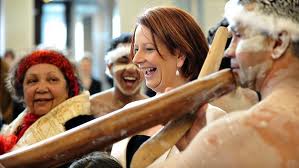ibobbly draws on stories from Aboriginal performers and uses psychological therapies proven to reduce suicidal thoughts
WATCH DETAILS OF THE APP on YOUTUBE
Consider the FACTS
-
Indigenous suicide rates five times higher than non-indigenous youth
-
New mobile app designed to provide culturally-relevant psychological care
-
Clinical trial launched by Yawuru man Patrick Dodson in Broome
Suicide rates in Aboriginal and Torres Strait Islander communities are amongst the highest in the world.
Despite increased funding and implementation of new prevention programs, very few indigenous people will seek help before acting on suicidal thoughts.
Black Dog Institute, in partnership with WA-based suicide prevention group Alive and Kicking Goals, is launching a trial of the world’s first suicide prevention app designed especially for use by indigenous people on mobile phones or tablet devices.
Called iBobbly (a name derived from a Kimberley greeting), the app delivers treatment-based therapy in a culturally relevant way. Based on psychological therapies proven to reduce suicidal thoughts, it draws heavily on indigenous metaphors, images and stories drawn from local Aboriginal artists and performers.
According to Black Dog Institute researcher Professor Helen Christensen, the app format leaps two of the major hurdles to help seeking-Percieved stigma and isolation
We know that indigenous Australians are not seeking face to face mental health care, more than 70% of indigenous suicides occur in people who are not previously known to health services.
“Indigenous youth have a high rate of mobile phone usage so it makes sense that we engage them on technology they are comfortable with and able to use in their own private time.”
“Once the app is downloaded they don’t need ongoing internet access and the program is password protected, thus maintaining confidentiality if the technology is shared amongst the community.”
“The initial pilot trial being run in WA will allow us to test and refine the program. We hope to expand iBobbly access to indigenous people living in other States later in 2014.”
iBobbly is funded by the Australian Government and NHMRC Centre for Research Excellence in Suicide Prevention. The program was developed in partnership with Alive and Kicking Goals, HITnet Innovations,
Thoughtworks, Muru Marri Indigenous Health Unit UNSW and the Young and Well Cooperative ResearchCentre. Samsung generously donated 150 tablets for the trial.
Interviews are available with Prof Helen Christensen (Black Dog Institute) and Joe Tighe (Alive and Kicking Goals).
Contact Joe Tighe on 0400 240 607 for more information.
Ends
UPDATE :NACCHO Launches new APP
The NACCHO APP promotes the sports healthy futures program that will give Aboriginal youth the opportunity to improve their overall health and wellbeing through active participation in sports.
Research shows that if a young person is happy and healthy they will be able to get the most out of their education, build their confidence and their self-belief and hopefully one day become a well-educated “Indigenous All-star” in the sport or employment of their choosing.” Mr. Mohamed said.
Mr. Mohamed said he is encouraging all 150 NACCHO members and stakeholders to promote the APP to their 5,000 staff and over 100,000 clients so that our community members can really have Aboriginal health in Aboriginal Hands. All ready in first few days over 1,000 Apps have been downloaded from the APP Store and Google Android store.
Here are the URL links to the App – alternatively you can type NACCHO into both stores and they come up!
iPhone/iPad
ios.giveeasy.org/naccho
Android
android.giveeasy.org/naccho
“The NACCHO App contains a geo locator, which will help you find the nearest Aboriginal Community Controlled Health Organisation in your area and provides heath information online and telephone on a wide range of topics and where you can go to get more information or assistance should you need urgent help “ Mr Mohamed said.
Health help includes:
Ambulance, Alcohol, Babies Breast Cancer, Cancer, Children, Depression, Diabetes, Domestic Violence, Drugs, eHealth, Eye Health, Gambling, Healthy Eating, Hearing, Male health, Medicare, Mental Health, Prostate cancer, Smoking , Suicide, Teenagers, Women’s Health.
The NACCHO App allows users to share, connect or contact NACCHO through our social media platforms such as Twitter, Facebook, daily news alerts and the NACCHO website.
– See more at: http://www.naccho.org.au/naccho-app/#sthash.wpLrnSWD.dpuf
Related articles
- NACCHO AGM Perth 2013 health news: Aboriginal life expectancy increases to Close the Gap (nacchocommunique.com)
- NACCHO Aboriginal Health News: How and when will the Abbott Government CLOSE THE GAP? (nacchocommunique.com)
- NACCHO press release:NACCHO launches new Aboriginal Health in Aboriginal Hands App (nacchocommunique.com)


